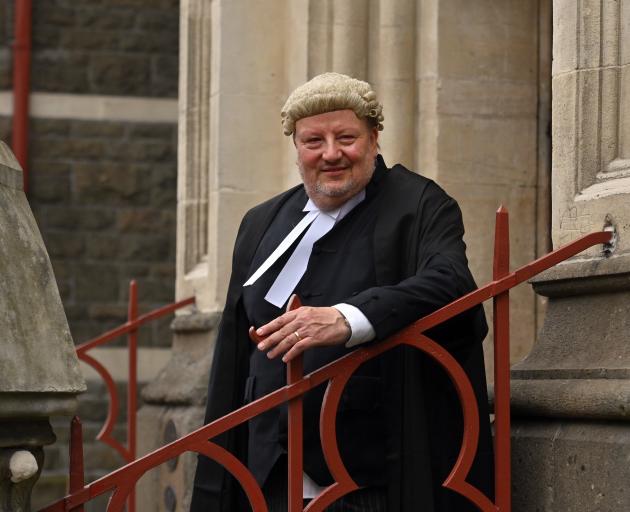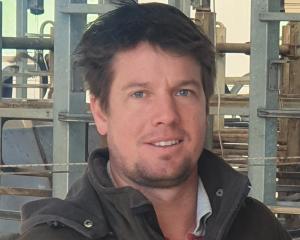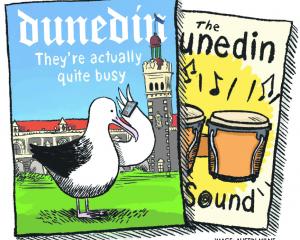
Barrister Len Andersen KC was a deadly serious advocate when presenting a case to the court, but he was also a larger than life individual who knew how to have fun — few people would have the moxie to drive around town with an "LA LAW" licence plate.
A revered teacher at the University of Otago and a lawyer much esteemed by his peers, Len Andersen was a leading figure in both the southern and national legal profession for decades, and never lost his passion for arguing a good case.
Leonard Andrew Andersen was born in Waipukurau on April 8, 1952, the eldest of seven children of farmer and salesman Brian Andersen and Helen Andersen (nee White), a teacher originally from Mosgiel.
From an early age Mr Andersen was determined to be a lawyer, and was undeterred by a primary school careers adviser who suggested that he consider something within his abilities.
After attending Napier Boys’ High School Mr Andersen ventured down to his mother’s home town to study law at the University of Otago.
His contemporaries included future Law School dean Mark Henaghan and now US-based legal and political philosopher Jeremy Waldron, a flatmate against whom Len Andersen debated while a student.
Mr Andersen served a term on the executive of the Otago University Students’ Association and a year as a teaching fellow at the Law School, and was admitted as a barrister and solicitor in 1975. He also married Linda Woodrow. He then returned to the North Island to do what he really wanted to do — be a practising lawyer.
Mr Andersen joined Whakatāne firm Osborne Handley Gray and Richardson and stayed there 15 years, dividing his time approximately evenly between family, criminal and civil cases. He and Linda separated and Mr Andersen married Jan Davies, the mother of his children James and Catherine — both of whom went on to become Otago law graduates.
During his time with the firm Mr Andersen acted in possibly his best-known case, Gillies v Keogh. He acted for Papamoa receptionist Bronwyn Gillies in an action which determined whether or not de facto relation property was held in a constructive trust: the case is still widely cited and taught today.
In 1991 Mr Andersen decided to move from Whakatāne to Dunedin to practise as a barrister. He returned to the city because Dunedin barrister Royden Somerville decided to set up a new set of chambers with him and three other lawyers.

The couple divorced early in 2000, and Jan died later that year. Mr Andersen was remarried in October 2003 to Moira Taylor, and became stepfather to Angela and Martin.
As well as working in his new chambers, Mr Andersen also returned to Law School. He had spent three months in the faculty in 1987, when on sabbatical, as a practitioner in residence, and discovered that he greatly enjoyed teaching.
For many years Mr Andersen took a wildly popular course in forensic law at Summer School and coached many an Otago team before legal competitions, but his forte was the highly prestigious, limited admission course in advocacy which he took during the academic year.
The lucky few who got to take that course (and I was fortunate enough to be one of them) received an unparalleled education in how a lawyer should present their cases, both on the papers and in the courtroom.
Mr Andersen proffered his material with the authority of lived experience, and also with a keen eye for the humour and idiosyncrasies that the law inspires. He was ever helpful but also rigorous — students had to be on their toes at all times.
During the final exam — a mock trial — "Judge" Andersen was playing with a pen, which flew out of his hand while I was trying to convince him of the accused’s guilt. It lay on the floor between us with the unspoken question "what do you do next?" hanging in the air. I never asked if he did it deliberately, but it was not beyond the realms of possibility.
Mr Andersen kept a close eye on graduates of his advocacy course, many of whom can testify to his willingness to provide information and assistance, often not even asked for or expected.
At Barristers Chambers Mr Andersen acted for a diverse range of clients, including representing opponents of the controversial proposal to build a covered stadium in Dunedin. Although a devoted rugby man, Mr Andersen rigorously presented the case against building a new home ground for his beloved Highlanders.
Mr Andersen also often acted for Port Otago and he represented it in many cases, including a long-running action to obtain resource consents to deepen the shipping channel.
In one of Mr Andersen’s final major cases he represented Port Otago all the way to the Supreme Court, where he was delighted to succeed in overturning a Court of Appeal ruling against the company.

Mr Andersen was a past-president of the Otago District Law Society and the Criminal Bar Association of New Zealand, of which he was a life member.
Mr Andersen’s time heading the CBA coincided with the Covid-19 lockdowns, and during weekly Zoom meetings with judges and the heads of other legal organisations he played an integral part in ensuring that the justice system continued to function despite the disruption caused by the pandemic.
He also served on the New Zealand Bar Association, was a past convener of the New Zealand Law Society Practice Approval Committee, and a University of Otago Law School faculty member since 1994.
He started a Howard League for Penal Reform branch in Dunedin and also supported the Prisoners Aid Society.
In 2020 Mr Andersen’s prominence and skill as a lawyer was recognised with his appointment as a QC. At a ceremony in a packed High Court room, Chief Justice Helen Winkelmann said just 274 QCs had been appointed in New Zealand in the past 113 years, and that "the role is reserved for the strong, the upright, the learned and the brave," — qualities that Mr Andersen embodied.
Mr Andersen was a firm believer in collegiality and assiduously presided over a monthly lunch across the road from the law courts, at Best Cafe and an annual Christmas dinner at the Dunedin Club.
He was also a dedicated bridge player, playing at a high level, and a voracious reader. As well as his dedication to rugby Mr Andersen was a keen music fan and in particular the music of Leonard Cohen. When the Canadian musician made his farewell tour to the southern hemisphere Len and Moira not only attended Cohen’s New Zealand concerts, but his Australian ones for good measure, a testament to a man who never did anything by halves, at work or at play.
Mr Andersen was still enthusiastically practising law, as he had for 47 years, when he suddenly fell ill late last year. He died in Dunedin on September 16, aged 71.
"We are going to take some time to adjust to Len not bursting into the morning tea room and enthusiastically regaling us with what he believed was a strong, novel and compelling submission that would certainly sway the court in an upcoming hearing," Royden Somerville said.
"The more he developed his reasoning between sips of coffee, the more convinced he became that the court couldn’t possibly fail to be impressed by his insightful logic. Len would then exit the morning tea rooms full of optimism and ready to promote justice." — Mike Houlahan, with assistance from Dr Royden Somerville KC












